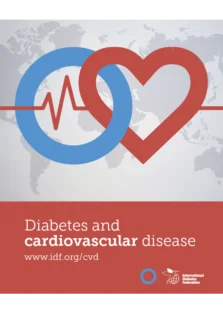Cardiovascular disease (CVD) affects the heart and blood vessels, causing potentially fatal complications such as heart attack and stroke. People with diabetes are two to four times more likely than others to develop cardiovascular disease.
Because this risk is so high, cardiovascular disease remains the most common cause of death in people with diabetes. Risk factors, including high blood pressure, high cholesterol and glucose, and obesity, increase the risk of cardiovascular complications.
CVD encompasses a range of conditions that affect the heart and blood vessels, such as coronary heart disease, heart attack and stroke. Recognising and managing diabetes risk factors is key to preventing or delaying the onset of CVD.

Know the main signs and symptoms of CVD:
- Chest pain
- Weakness or numbness in your arms or legs
- Shortness of breath
- Dizziness or lightheadedness
- Irregular heartbeat, palpitations
- Extreme tiredness or chronic fatigue
- Swelling in the legs or ankles
If you experience any of these signs and symptoms, consult a healthcare professional for further evaluation and guidance.
CVD risks
One of the most life-threatening complications of CVD in people with diabetes is a heart attack. Diabetes can damage blood vessels and promote the formation of fatty deposits in arterial walls, eventually leading to a blockage, resulting in a heart attack.
Another cardiovascular complication that people with diabetes may face is a stroke. Diabetes can contribute to the formation of blood clots, which can block blood flow to the brain. This blockage prevents oxygen and nutrients from reaching brain cells, causing damage or cell death.
The risk of stroke can be reduced by closely monitoring glucose and blood pressure levels.
In addition to heart attack and stroke, people with diabetes are at a higher risk of developing peripheral arterial disease (PAD). PAD affects the blood flow to the arms and feet, leading to symptoms such as pain, numbness, and delayed wound healing. Maintaining optimal glucose levels and regular medical check-ups can help detect and manage PAD before it progresses to more severe complications, such as foot ulcers and amputation.
Being aware of the CVD risk factors can help people with diabetes, their caregivers and healthcare professionals implement strategies to prevent or limit cardiovascular complications.
Managing the risks
While living with diabetes increases the risk of cardiovascular complications, there are strategies to reduce this risk and maintain optimal heart health.
Healthy lifestyle habits
Healthy lifestyle habits are core to managing diabetes and minimising CVD risk. A balanced diet, focusing on low-glycemic index foods and portion control, can help manage glucose levels and prevent the buildup of artery-clogging fatty deposits.
Similarly, regular physical activity helps control weight, improve insulin sensitivity, and promote cardiovascular fitness.
Behavioural risk factors
Smoking and excessive alcohol consumption are additional risk factors for CVD in people with diabetes. Both behaviours increase the risk of CVD and can have detrimental effects on overall health. If you are a smoker, working with your healthcare provider to develop a strategy to quit smoking is highly recommended. Moderating or avoiding alcohol consumption can prevent fluctuations in glucose levels that can lead to complications.
Addressing the needs of at-risk populations
Studies have shown that people from certain racial, ethnic and minority groups living in Western societies are at increased risk of cardiovascular disease. This is exacerbated by social disparities regarding access to quality education and health care, a safe living environment and nutritious food. These disparities highlight the importance of addressing gender and racial/ethnic differences to reduce cardiovascular disease risk and mortality among people with diabetes.
Multi-sectoral approach
Reducing the risk of diabetes-related cardiovascular complications requires a multi-sectoral approach. Key actors include healthcare professionals, diabetes associations, community support groups and diabetes advocates. Through awareness raising, diabetes education and implementing effective policies, we can empower people to make informed decisions about their health and reduce the impact of diabetes-related CVD.
A multi-sectoral approach can empower people with diabetes and their caregivers to develop effective strategies to limit cardiovascular complications.
Take control of your heart health
Adopting a healthy lifestyle, managing risk factors, and maintaining regular health check-ups can reduce the likelihood of developing diabetes-related cardiovascular complications. If you have diabetes, knowing the connection between diabetes and cardiovascular disease can help you take control of your heart health and delay or prevent complications.
The power of registries
Diabetes and diabetes complications registries can improve healthcare access and quality and facilitate epidemiological research. The iCaReMe registry is an international observational study that collects real-world evidence on diabetes and cardio-renal complications. Healthcare professionals can access a cloud-based tool to monitor data and follow up with their patients. The registry data are used to evaluate the quality of care, inform policies and raise awareness of risks associated with CVD and CKD.
Related resources

Type 2 Diabetes and the Heart

Diabetes and cardiovascular disease

Diabetes and Cardiovascular Disease Report

